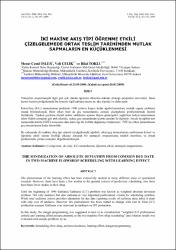| dc.contributor.author | Isler, Mesut Cemil | |
| dc.contributor.author | Celik, Veli | |
| dc.contributor.author | Toklu, Bilal | |
| dc.date.accessioned | 2020-06-25T17:48:25Z | |
| dc.date.available | 2020-06-25T17:48:25Z | |
| dc.date.issued | 2009 | |
| dc.identifier.citation | İşler, M. C., Çelik, V., Toklu, B. (2009). İki makine akış tipi öğrenme etkili çizelgelemede ortak teslim tarihinden mutlak sapmaların en küçüklenmesi. Gazi Üniversitesi Mühendislik Mimarlık Fakültesi Dergisi, 24(2), 351 - 357. | en_US |
| dc.identifier.issn | 1300-1884 | |
| dc.identifier.issn | 1304-4915 | |
| dc.identifier.uri | https://hdl.handle.net/20.500.12587/4443 | |
| dc.description | WOS: 000273608300018 | en_US |
| dc.description.abstract | The phenomenon of the learning effect has been extensively studied in many different areas of operational research. However, there have been a few studies in the general context of production scheduling; also there have been fewer studies in flow-shop. Until the beginning of 1990 Earliness/Tardiness (E/T) problem was known as weighted absolute deviation problem. Not only tardiness but also earliness is very important performance criteria for scheduling problem. While total tardiness criteria provides adaptation for due date (ignoring results of earliness done jobs), it deals with only cost of tardiness. However this phenomenon has been started to change with Just in Time (JIT) production concept. Earliness is as important as tardiness on JIT production. In this study, the integer programming was suggested to take in to consideration "weighted E/T performance criteria and learning effect process property at the two machine flow-shop scheduling" and solution results was evaluated with sample problems by us. | en_US |
| dc.language.iso | tur | en_US |
| dc.publisher | Gazi Univ, Fac Engineering Architecture | en_US |
| dc.rights | info:eu-repo/semantics/openAccess | en_US |
| dc.subject | Scheduling | en_US |
| dc.subject | flow-shop | en_US |
| dc.subject | earliness/tardiness | en_US |
| dc.subject | learning effect | en_US |
| dc.subject | integer programming | en_US |
| dc.title | The minimization of absolute deviation from common due date in two machine flowshop scheduling with learning effect | en_US |
| dc.type | article | en_US |
| dc.contributor.department | Kırıkkale Üniversitesi | en_US |
| dc.identifier.volume | 24 | en_US |
| dc.identifier.issue | 2 | en_US |
| dc.identifier.startpage | 351 | en_US |
| dc.identifier.endpage | 357 | en_US |
| dc.relation.journal | Journal Of The Faculty Of Engineering And Architecture Of Gazi University | en_US |
| dc.relation.publicationcategory | Makale - Uluslararası Hakemli Dergi - Kurum Öğretim Elemanı | en_US |
















